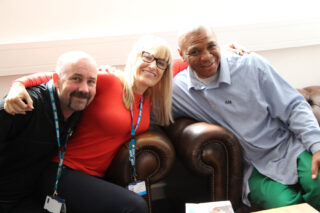Q Exchange
Peer Mentor Training and Support NB: Duplicate – idea already published but system has created a duplicate page.
- Idea
- 2018

Meet the team: BCH Patient Empowerment Team
Also:
- Mathew Arescog, Bristol Community Health Patient and Public Empowerment Lead
- Rami Ghali, Chief Executive Officer, Brigstowe
- Nicola Mead, BCH Diabetes and Nutrition Service Manager and Clinical Lead for Diabetes Specialist Nursing
- Fiona Spence, BCH Equality and Diversity Co-ordinator
Our partnership
Bristol Community Health is not-for-profit social enterprise and the leading provider of publicly-funded community health services for adults, children and offenders to a population of around 500 000 in and around Bristol. As well as clinical services, we provide a service for older people to address social isolation (Community Navigators), and have an active cohort of volunteers working across our services, with the appropriate resource, support and infrastructure to manage this valuable workforce.
We have successfully developed volunteer Peer Mentors in our prison healthcare setting – see attached supporting document.
Prisoners trained to work with other prisoners with a history of substance misuse, support them to understand and better manage their health and wellbeing while in prison and on the outside. The mentors gain a qualification, which improves their confidence and skills and ultimately, their chances of making a contribution to wider society on release.
Our programme has been highly valued by the Peer Mentors and the prisoners accessing the service, and we now want to roll out this tried and tested model in the wider community, to support people managing long term conditions such as diabetes, COPD and heart failure.
BCH are partnering with an innovative local charity – Brigstowe – an organisation which shares our own values and has extensive experience of – and evidence based methodology for – delivering peer support (See http://www.brigstowe.org/get-involved/volunteer-stories/), which we will combine with our own clinical expertise for this project.
Brigstowe provide advice and support to people living with, or affected by, another long term condition – HIV. Their vision is a world in which people with HIV live long and healthy lives, free from poverty, stigma, prejudice and discrimination. They help Positive people to increase and maintain independence and to meet their changing needs. Their strategy is to diversify their existing, extensive experience of supporting people living with HIV to supporting people with other long-term conditions.
This is all entirely consistent with BCH’s approach within our own services to keeping people with physical health conditions safe and independent, and empowered to self-manage.
Our Peer Mentor project
Our unique project combines our own clinical expertise, Shared Decision Making and Patient Activation approaches with Brigstowe’s peer support model for people newly diagnosed or struggling with their HIV diagnosis. In so doing, we will create a bespoke programme to support people newly diagnosed with diabetes, with a view to extending it to other long term conditions.
We know that any diagnosis is a time of uncertainty and anxiety for many people. It can result in isolation, denial, depression, risk-taking and a general physical decline. For people with long term conditions, it is essential that the correct support is offered to educate and build confidence, and reassure that with the right informed choices, they can continue to live their lives.
BCH’s Specialist Diabetes service already provides a range of education and self-care tools and resources, but messages are often better received – and behaviour sustained – if they come from a peer with lived experience, rather than a healthcare professional alone.
Individuals on our programme will meet with their volunteer Mentor on a regular basis for up to six months. Mentors will be recruited, trained, supported and supervised by a Peer Support Coordinator and Senior Peer Mentors, with the option of becoming qualified in an Open College Network Peer Mentoring Qualification.
We will offer people with diabetes a safe place to meet with someone who can help them understand their diagnosis, experience acceptance and explore complex disclosure issues, as well as sharing information and advice regarding treatment and how to navigate the healthcare system.
Expected outcomes
The main outcomes of the Brigstowe Peer Mentor service include improved health and management of an HIV diagnosis as a long term health condition, better emotional and mental wellbeing and feeling less isolated and more connected. As an example, in 2016-2017, 85% of service users reported an increase in understanding and knowledge of HIV, 83% reported an increase in engaging with medical treatment, 93% reported a better knowledge of available services and confidence to access if required, and 93% reported an increased sense of purpose in life
We will be measuring the same elements for the diabetes project and expect to see similar outcomes.
The service will also provide the volunteer Peer Mentors with an opportunity to gain new skills, increasing their self-esteem, confidence and sense of purpose and reducing isolation. This will help them to take a more active part in their wider community, therefore increasing community cohesion.
Conclusion
Our project and partnership will provide and demonstrate a genuinely holistic model of care for people living with diabetes, putting a person-centred approach into practice. Providing peer mentoring support means that people with lived experience supplemented by expert clinical support can provide real life examples of the benefit of effective self-management to others.
How you can contribute
- Peer feedback about our idea
- Shared experience if anyone else has done this type of project before
- Lessons learned
- Support for project evaluation.
Further information
Community health news – issue 9 – Jan 2018_peer mentoring (PDF, 187KB)
Comments
Hayley Richards 26 May 2018
Hi Claire, we have very positive experience of peer mentors in mental health. Since long term mental and physical health conditions so often coexist, including in diabetes, I’d be interested to explore this idea with you further.
Kind regards Hayley
Comments are now closed for this post.